新概念三册40课课件
新概念英语第三册逐句精讲:第40课:真假难辨

Lesson40Who's Who 真假难辨 新概念3课⽂内容: It has never been explained why university students seem to enjoy practical jokes more than anyone else. Students specialize in a particular type of practical joke: the hoax. Inviting the fire brigade to put out a nonexistent fire is a crude form of deception which no self-respecting student would ever indulge in. Students often create amusing situations which are funny to everyone except the victims. When a student recently saw two workmen using a pneumatic drill outside his university, he immediately telephoned the police and informed them that two students dressed up as workmen were tearing up the road with a pneumatic drill. As soon as he had hung up, he went over to the workmen and told them that if a policeman ordered them to go away, they were not to take him seriously. He added that a student had dressed up as a policeman and was playing all sorts of silly jokes on people. Both the police and the workmen were grateful to the student for this piece of advance information. The student hid in an archway nearby where he could watch and hear everything that went on. Sure enough, a policeman arrived on the scene and politely asked the workmen to go away. When he received a very rude reply from one of the workmen, he threatened to remove them by force. The workmen told him to do as he pleased and the policeman telephoned for help. Shortly afterwards, four more policemen arrived and remonstrated with the workmen. As the men refused to stop working, the police attempted to seize the pneumatic drill. The workmen struggled fiercely and one of them lost his temper. He threatened to call the police. At this, the police pointed out ironically that this would hardly be necessary as the men were already under arrest. Pretending to speak seriously, one of the workmen asked if he might make a telephone call before being taken to the station. Permission was granted and a policeman accompanied him to a pay phone. Only when he saw that the man was actually telephoning the police did he realize that they had all been the victims of a hoax. 新概念英语3逐句精讲: 1.It has never been explained why university students seem to enjoy practical jokes more than anyone else. 谁也弄不清为什么⼤学⽣好像⽐任何⼈都更喜欢恶作剧。
新概念英语第三册逐句精讲语言点第40课(2)

新概念英语第三册逐句精讲语言点第40课(2)Who's Who 真假难辨It has never been explained why university students seem to enjoy practical jokes more than anyone else. Students specialize in a particular type of practical joke: the hoax. Inviting the fire brigade to put out a nonexistent fire is a crude form of deception which no self-respecting student would ever indulge in. Students often create amusingsituations which are funny to everyone except the victims. When a student recently saw two workmen using a pneumaticdrill outside his university, he immediately telephoned the police and informed them that two students dressed up as workmen were tearing up the road with a pneumatic drill. As soon as he had hung up, he went over to the workmen and told them that if a policeman ordered them to go away, they were not to take him seriously. He added that a student had dressed up as a policeman and was playing all sorts of silly jokes on people. Both the police and the workmen weregrateful to the student for this piece of advance information.The student hid in an archway nearby where he could watch and hear everything that went on. Sure enough, a policemanarrived on the scene and politely asked the workmen to go away. When he received a very rude reply from one of the workmen, he threatened to remove them by force. The workmen told him to do as he pleased and the policeman telephoned for help. Shortly afterwards, four more policemen arrived and remonstrated with the workmen. As the men refused to stop working, the police attempted to seize the pneumatic drill. The workmen struggled fiercely and one of them lost histemper. He threatened to call the police. At this, the police pointed out ironically that this would hardly be necessary as the men were already under arrest. Pretending to speak seriously, one of the workmen asked if he might make a telephone call before being taken to the station. Permission was granted and a policeman accompanied him to a pay phone. Only when he saw that the man was actually telephoning the police did he realize that they had all been the victims of a hoax.4.Students often create amusing situations which are funnyto everyone except the victims.大学生们常常做的是制造一种可笑的局面,使大家笑上一场,当然受害者是笑不出来的。
新概念英语第三册逐句精讲语言点第40课(7)
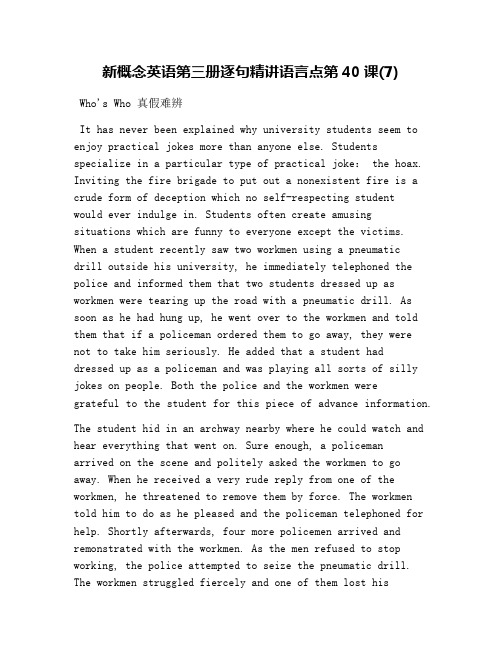
新概念英语第三册逐句精讲语言点第40课(7)Who's Who 真假难辨It has never been explained why university students seem to enjoy practical jokes more than anyone else. Students specialize in a particular type of practical joke: the hoax. Inviting the fire brigade to put out a nonexistent fire is a crude form of deception which no self-respecting student would ever indulge in. Students often create amusingsituations which are funny to everyone except the victims. When a student recently saw two workmen using a pneumaticdrill outside his university, he immediately telephoned the police and informed them that two students dressed up as workmen were tearing up the road with a pneumatic drill. As soon as he had hung up, he went over to the workmen and told them that if a policeman ordered them to go away, they were not to take him seriously. He added that a student had dressed up as a policeman and was playing all sorts of silly jokes on people. Both the police and the workmen weregrateful to the student for this piece of advance information.The student hid in an archway nearby where he could watch and hear everything that went on. Sure enough, a policemanarrived on the scene and politely asked the workmen to go away. When he received a very rude reply from one of the workmen, he threatened to remove them by force. The workmen told him to do as he pleased and the policeman telephoned for help. Shortly afterwards, four more policemen arrived and remonstrated with the workmen. As the men refused to stop working, the police attempted to seize the pneumatic drill. The workmen struggled fiercely and one of them lost histemper. He threatened to call the police. At this, the police pointed out ironically that this would hardly be necessary as the men were already under arrest. Pretending to speak seriously, one of the workmen asked if he might make a telephone call before being taken to the station. Permission was granted and a policeman accompanied him to a pay phone. Only when he saw that the man was actually telephoning the police did he realize that they had all been the victims of a hoax.19. Permission was granted and a policeman accompanied him toa pay phone.警察同意了,陪他来到一个投币地电话前。
新概念英语第三册逐句精讲语言点第40课(6)
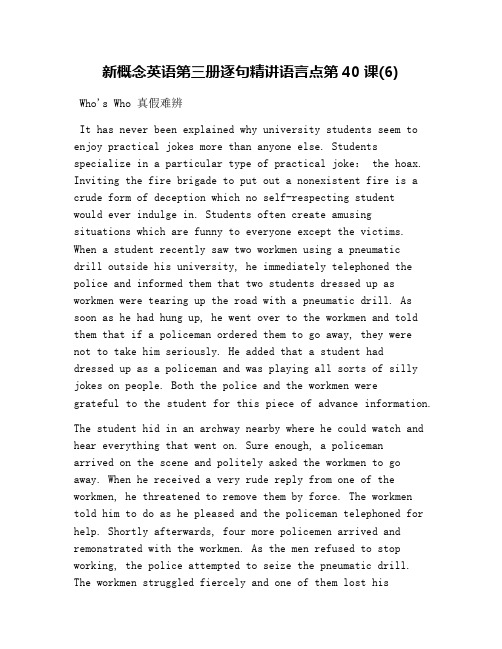
新概念英语第三册逐句精讲语言点第40课(6)Who's Who 真假难辨It has never been explained why university students seem to enjoy practical jokes more than anyone else. Students specialize in a particular type of practical joke: the hoax. Inviting the fire brigade to put out a nonexistent fire is a crude form of deception which no self-respecting student would ever indulge in. Students often create amusingsituations which are funny to everyone except the victims. When a student recently saw two workmen using a pneumaticdrill outside his university, he immediately telephoned the police and informed them that two students dressed up as workmen were tearing up the road with a pneumatic drill. As soon as he had hung up, he went over to the workmen and told them that if a policeman ordered them to go away, they were not to take him seriously. He added that a student had dressed up as a policeman and was playing all sorts of silly jokes on people. Both the police and the workmen weregrateful to the student for this piece of advance information.The student hid in an archway nearby where he could watch and hear everything that went on. Sure enough, a policemanarrived on the scene and politely asked the workmen to go away. When he received a very rude reply from one of the workmen, he threatened to remove them by force. The workmen told him to do as he pleased and the policeman telephoned for help. Shortly afterwards, four more policemen arrived and remonstrated with the workmen. As the men refused to stop working, the police attempted to seize the pneumatic drill. The workmen struggled fiercely and one of them lost histemper. He threatened to call the police. At this, the police pointed out ironically that this would hardly be necessary as the men were already under arrest. Pretending to speak seriously, one of the workmen asked if he might make a telephone call before being taken to the station. Permission was granted and a policeman accompanied him to a pay phone. Only when he saw that the man was actually telephoning the police did he realize that they had all been the victims of a hoax.16. He threatened to call the police.威胁说要去叫警察。
新概念英语第3册课程讲义Lesson40
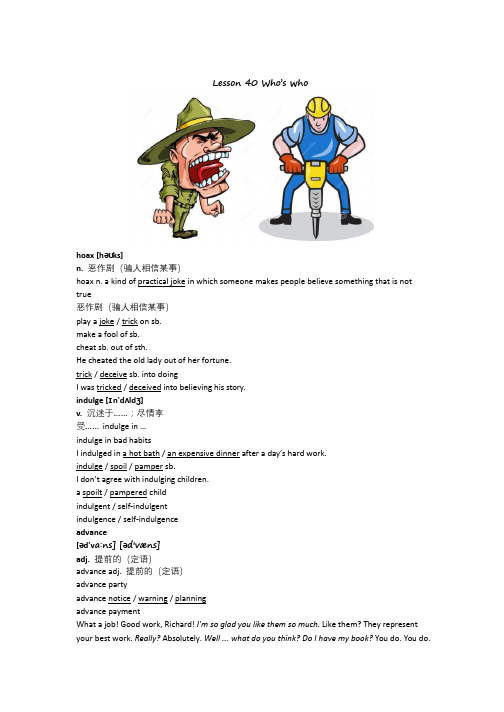
Lesson 40 Who’s whohoax [həʊks]n. 恶作剧(骗人相信某事)hoax n. a kind of practical joke in which someone makes people believe something that is not true恶作剧(骗人相信某事)play a joke / trick on sb.make a fool of sb.cheat sb. out of sth.He cheated the old lady out of her fortune.trick / deceive sb. into doingI was tricked / deceived into believing his story.indulge [ɪn'dʌldʒ]v. 沉迷于……;尽情享受…… indulge in …indulge in bad habitsI indulged in a hot bath / an expensive dinner after a day’s hard work.indulge / spoil / pamper sb.I don’t agree with indulging children.a spoilt / pampered childindulgent / self-indulgentindulgence / self-indulgenceadvance[əd'vɑ:ns] [əd'væns]adj. 提前的(定语)advance adj. 提前的(定语)advance partyadvance notice / warning / planningadvance paymentWhat a job! Good work, Richard! I'm so glad you like them so much. Like them? They represent your best work. Really? Absolutely. Well ... what do you think? Do I have my book? You do. You do.There’s a book here. I'll have a contract and an advance payment waiting for you, first thing in the morning.in advanceRent must be paid one month in advance.in advance of …Galileo’s ideas were in advance of the age in which he lived.advanced adj. 高级的, 先进的advanced technologyan elementary / intermediate / advanced English courseelementary / intermediate / advanced English learnersremonstrate ['remənstreɪt] [rɪ'mɑ:nstreɪt]v. 抗议,规劝,告诫remonstrate with sb. (fml.) 向某人抗议The coach angrily remonstrated with the referee.Shortly afterwards, four more policemen arrived and remonstrated with the workmen. demonstrate v. 展示, 表明protest against …聚众抗议……complain (to sb.) of / about sth.Several people complained of cat-like noises at night and a businessman on a fishing trip saw the puma up a tree.Almost immediately he began to complain about the weather, for even though it was still summer, it rained continually and it was often bitterly cold.nag sb. to do …When my wife nagged me to do something about it, I told her that either I would have to buy a new mower or let the grass grow.pester sb. to do …From the moment he arrived there, he kept on pestering his doctor to tell him when he would be able to go home.ironically [aɪ'rɒnɪklɪ]adv. 讽刺地ironically / sarcasticallyAt this, the police pointed out ironically that this would hardly be necessary as the men were already under arrest.'Perfume, eh?' he asked sarcastically. 'You should have declared that. Perfume is not exempt from import duty.'ironic / sarcasticI was almost there when a sarcastic voice below said, 'I don't think the windows need cleaning at this time of the night.'irony / sarcasmwith heavy irony / sarcasm'Good of you to arrive on time,' George said, with heavy irony / sarcasm.hint / trace / touch of irony / sarcasmThere was a hint of irony / sarcasm in her voice.the irony of fateIt's ironic that she became a teacher ―she used to hate school.Ironically, his cold got better on the last day of his holiday.who’s who 谁是谁(名字、职务等)You’ll soon get to know who’s who in the company.which is whichThe twins are so alike that I can’t tell which is which.When Scarlet returned to the farm, the old maidservant began to tell her who married whom, who had what children and so on.It has never been explained why university students seem to enjoy practical jokes more than anyone else.nobody can explain why …it has never been explained why …造句:谁也无法解释玛雅(Maya) 文明为什么会突然从地球上消失(vanish)。
新概念英语第三册逐句精讲语言点第40课(4)
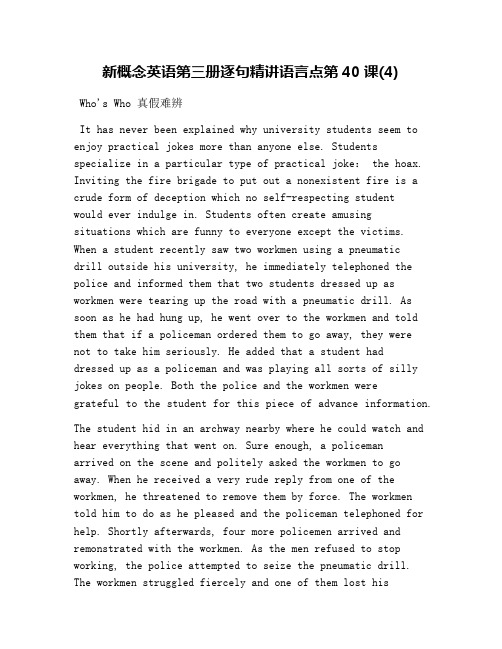
新概念英语第三册逐句精讲语言点第40课(4)Who's Who 真假难辨It has never been explained why university students seem to enjoy practical jokes more than anyone else. Students specialize in a particular type of practical joke: the hoax. Inviting the fire brigade to put out a nonexistent fire is a crude form of deception which no self-respecting student would ever indulge in. Students often create amusingsituations which are funny to everyone except the victims. When a student recently saw two workmen using a pneumaticdrill outside his university, he immediately telephoned the police and informed them that two students dressed up as workmen were tearing up the road with a pneumatic drill. As soon as he had hung up, he went over to the workmen and told them that if a policeman ordered them to go away, they were not to take him seriously. He added that a student had dressed up as a policeman and was playing all sorts of silly jokes on people. Both the police and the workmen weregrateful to the student for this piece of advance information.The student hid in an archway nearby where he could watch and hear everything that went on. Sure enough, a policemanarrived on the scene and politely asked the workmen to go away. When he received a very rude reply from one of the workmen, he threatened to remove them by force. The workmen told him to do as he pleased and the policeman telephoned for help. Shortly afterwards, four more policemen arrived and remonstrated with the workmen. As the men refused to stop working, the police attempted to seize the pneumatic drill. The workmen struggled fiercely and one of them lost histemper. He threatened to call the police. At this, the police pointed out ironically that this would hardly be necessary as the men were already under arrest. Pretending to speak seriously, one of the workmen asked if he might make a telephone call before being taken to the station. Permission was granted and a policeman accompanied him to a pay phone. Only when he saw that the man was actually telephoning the police did he realize that they had all been the victims of a hoax.10.Sure enough, a policeman arrived on the scene andpolitely asked the workmen to go away.果然,警察来了,不礼貌地请工人离开此地。
昂立新概念3讲义(第四版) Lesson 40 教师版

昂立新概念3讲义第四版(教师版)最新讲义Lesson 40 Who’s whoPart 1 Words and Expressions(1) hoax n. 骗局,戏弄(an act intended to make sb. believe sth. that is not true, especially sth. unpleasant)a bomb hoax 炸弹恐吓对某人恶作剧:play a hoax on sb. = play a trick on sb.开某人玩笑:play a joke on sb.趣味联想:愚人节被人愚弄的人:April Fish(2) deception n. 欺骗,骗局( the act of deliberately making sb. believe sth. that is not true)她说这药片是甜甜的,这无伤大雅的谎话让孩子们吃药变得容易点了。
She described the pills as sweet, so the harmless deception made it easier for her child to take them.He was accused of obtaining property by deception.他被指控骗取钱财。
派生词:动词deceive形容词deceptive (likely to make you believe sth. that is not true)(3) self-respecting adj. 自重的((especially in negative sentences) having pride in yourself because you believe that what you do is right and good)扩展:self-important 妄自尊大的self-employed 个体经营的self-educated 自学的self-centered 自我中心的self-controlled 自我克制的(4) indulge v. 使沉迷( to allow yourself to have or do sth. that you like, especially sth. that is considered bad for you)结构:indulge oneself in = be indulged in = be addicted toForeign countries might indulge in frippery (便宜而俗艳的东西), but England ought to pride herself on her plainness and simplicity. (0603中级口译)其他国家在沉溺于奢华的时候,英国应该以艰苦朴素为荣。
新概念3Lesson 40 Who’s who 知识点课件(共21张PPT)

At this, the police pointed out ironically that this would hardly be necessary as the men were already under arrest.
Lesson 40 Who’s who
hoax
an attempt to make people believe something that is not true hoax calls (=telephone calls giving false information) to the police
Both the police and the workmen were grateful to the student for this piece of advance information.
be a piece of cake
piece of music/writing/sculpture etc be a piece of shit/crap(show your despise of sb’s saying)
Practical joke: a surprise or shock, or to make them look stupid
Students specialize in a particular type of practical joke: the hoax.
Specialize in:
practical joke. Hoax.
As the men refused to stop working, the police attempted to seize the pneumatic drill. The workmen struggled fiercely and one of them lost his temper. He threatened to call the police.
新概念第三册经典讲义ppt_lesson40(共11页)
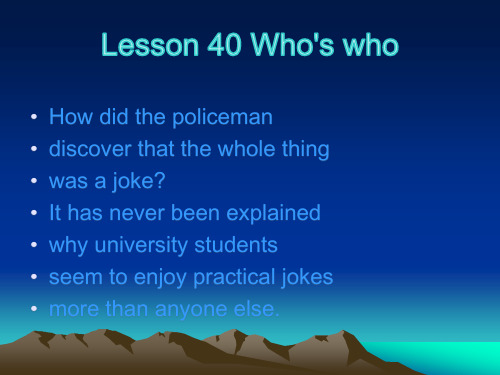
• At this, • the police pointed out ironically • that this would hardly be necessary • as the men were already under arrest. • Pretending to speak seriously, • one of the workmen asked • if he might make a telephone call • before being taken to the station.
• which are funny to everyone • except the victims. • When a student • recently saw two workmen • using a pneumatic • drill outside his university, • he immediately telephoned the police • and informed them • that two students • dressed up as workmen • w• Students specialize • in a particular type of practical joke: • the hoax. • Inviting the fire brigade • to put out a nonexistent fire • is a crude form of deception • which no self-respecting student • would ever indulge in. • Students often create • amusing situations
新概念英语第三册逐句精讲语言点第40课(3)
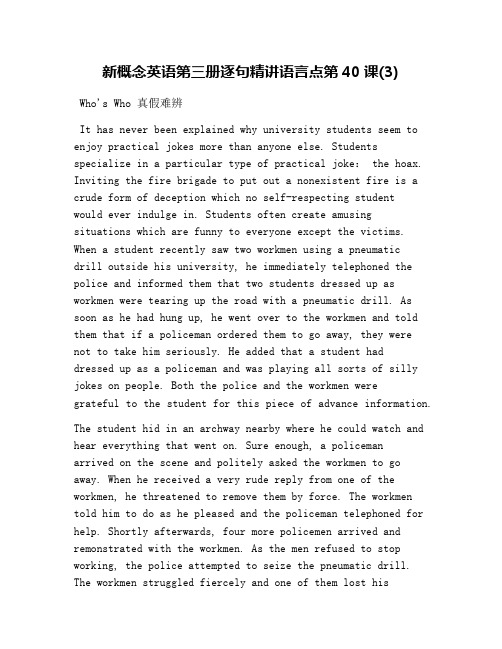
新概念英语第三册逐句精讲语言点第40课(3)Who's Who 真假难辨It has never been explained why university students seem to enjoy practical jokes more than anyone else. Students specialize in a particular type of practical joke: the hoax. Inviting the fire brigade to put out a nonexistent fire is a crude form of deception which no self-respecting student would ever indulge in. Students often create amusingsituations which are funny to everyone except the victims. When a student recently saw two workmen using a pneumaticdrill outside his university, he immediately telephoned the police and informed them that two students dressed up as workmen were tearing up the road with a pneumatic drill. As soon as he had hung up, he went over to the workmen and told them that if a policeman ordered them to go away, they were not to take him seriously. He added that a student had dressed up as a policeman and was playing all sorts of silly jokes on people. Both the police and the workmen weregrateful to the student for this piece of advance information.The student hid in an archway nearby where he could watch and hear everything that went on. Sure enough, a policemanarrived on the scene and politely asked the workmen to go away. When he received a very rude reply from one of the workmen, he threatened to remove them by force. The workmen told him to do as he pleased and the policeman telephoned for help. Shortly afterwards, four more policemen arrived and remonstrated with the workmen. As the men refused to stop working, the police attempted to seize the pneumatic drill. The workmen struggled fiercely and one of them lost histemper. He threatened to call the police. At this, the police pointed out ironically that this would hardly be necessary as the men were already under arrest. Pretending to speak seriously, one of the workmen asked if he might make a telephone call before being taken to the station. Permission was granted and a policeman accompanied him to a pay phone. Only when he saw that the man was actually telephoning the police did he realize that they had all been the victims of a hoax.7.He added that a student had dressed up as a policeman and was playing all sorts of silly jokes on people.还对工人说,有个学生常装扮成警察无聊地同别人开玩笑。
新概念三册Lesson40备课笔记ppt
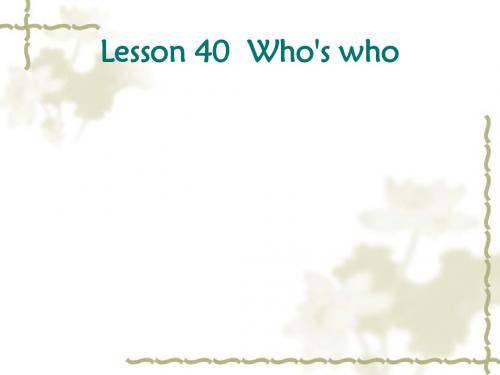
Text:
(L13) The student hid in an archway nearby where he could watch and hear everything that went on. Sure enough, a policeman arrived on the scene and politely asked the workmen to go away. When he received a very rude reply from one of the workmen, he threatened to remove them by force.
Text:
(L2) Students specialize in a particular type of practical joke: the hoax.
(L2)specialize in擅长 同: be good at be skilled in be expert in be adept at be accomplished in
Text:
(L11) He added that a student had dressed up as a policeman and was playing all sorts of silly jokes on people. Both the police and the workmen were grateful to the student for this piece of advance information.
permission n.许可 special permission 特许 without permission 未经许可 -Parents always told us not to take other's things without permission when we were young. ask sb. for permission 寻求许可 give/grant sb. permission 给与许可
新概念三册Lesson40精品PPT课件

❖ deception n.欺骗 ❖ deceive ❖ 【辨】 ❖ deceit 强调一个人对另一个的故意欺骗
❖ self-respecting adj.自重的 ❖ self-表示“自...”: ❖ self-abuse 自责,自虐 ❖ self-abandonment ❖ 自暴自弃
❖ Text:
❖ (L1) It has never been explained why university students seem to enjoy practical jokes more than anyone else.
❖ (L1) university student 大学生 ❖ 相关词汇:
❖ How did the police and the workmen react? …grateful to …
police
two workmen
politely asked the workmen to go away
give a rude reply
threatened to remove them by force
❖ without permission 未经许可 ❖ -Parents always told us not to take
other's things without permission when we were young. ❖ ask sb. for permission 寻求许可 ❖ give/grant sb. permission 给与许可
Two workmen using a pneumatic drill outside his university
新概念英语第三册ppt课件

convoy
①n.护送的船队或车队 in (a)convoy 同行结伴
We decide to travel in convoy so that no one could lose his way.(结伴同游) under(a) convoy 与...护航,在...的护航下
The weapons were sent under convoy. convoy ship 护卫舰 ②v.护航,护送
Nothing of value was found, but the numerous items which were brought to the surface proved to be of great interest. 但没发现什么值钱的东西,不过打捞出来的众多的物 品还是引起了大家极大的兴趣。 nothing of value = valuble numerous = countless of great interest= very much interesting 极有趣的 of no interest = uninteresting 没有意思 of great significance = significant of great importance = important of no consequence = of no importance 无足轻重的
.
cargo (复数cargos;cargoes)
the goods carried by ship, plane or vehicle (通常用于船运) unload the cargoes from the ship 卸货 a cargo plane/ship/train The ship has a cargo of 1000 tons.
新概念第三册 L40课文及单词详解课件

New Words
12. duty n. 税
duty free 免税 Customs duty 关税 近义词:tax
income tax 所得税
Stamp duty 印花税
New Words
13. unscrew v. 拧开
screw v. 拧紧;用螺丝固定 n. 螺钉 unscrew a cap 拧开盖子 She ____ ____ ____ ____(拧开......的盖) her water bottle and gave it to him. 答案: unscrewed the cap of
这个职员打了一通恶作剧电话,假装是老板。 The clerk made a ____ ____ pretending to be the boss. 答案:hoax call
New Words
2. deception n. 欺骗;骗局(指无关紧要的欺骗,有时也指利已的不诚实行为)
辨析:
deceit [dɪ'si:t] :强调一个人对另一个的故意欺骗(指歪曲实情, 惯于说谎或蓄意欺骗。)
(1) 并列句,用but连接。第一分句的主语为Customs Officiers, 海关官员;第二个分 句中and连接两个并列谓语,其中when引导时间状语从句。
(2) these days 意为“目前,现在”
(3) have nothing to declare意为“没有东西需要申报”,have nothing 后接动词不定式 表示“没有东西可......”, 另外have nothing to do 无事可做,have nothing to say 无话可 说。
in + 名词,表示一种状态: 秩序井然: in good order 身体健康:in good health 心情好: in a good mood 脾气好: in a good temper
(完整word版)新概念英语第三册笔记第40课(word文档良心出品)
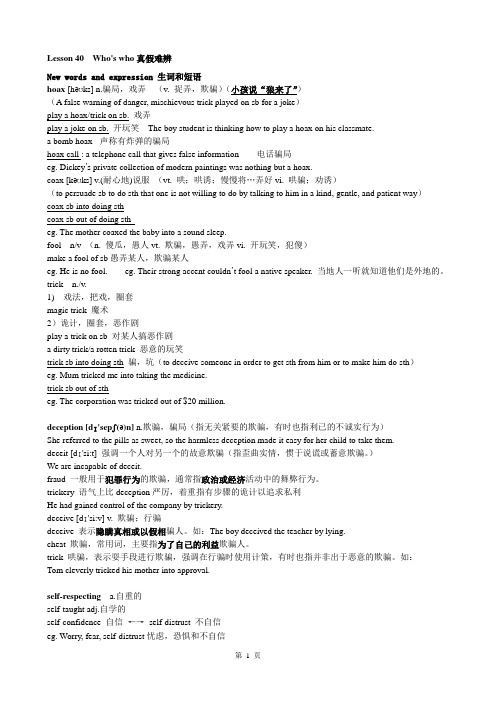
We are incapable of deceit.
fraud一般用于犯罪行为的欺骗,通常指政治或经济活动中的舞弊行为。
trickery语气上比deception严厉,着重指有步骤的诡计以追求私利
He had gained control of the company by trickery.
Lesson 40 Who's who
New words and expression 生词和短语
hoax[həʊks]n.骗局,戏弄(v.捉弄,欺骗)(小孩说“狼来了”)
(Afalse warning of danger, mischievous trick played on sb for a joke)
She indulges her only son.
abandon oneselftosth放纵,放肆,尽情(to feel an emotion so strongly that you let it control you completely)
eg. He abandon himself to grief他不胜悲痛。(恣意,忘情)
deceive[dɪ'si:v]v.欺骗;行骗
deceive表示隐瞒真相或以假相骗人。如:The boy deceived the teacher by lying.
cheat欺骗,常用词,主要指为了自己的利益欺骗人。
trick哄骗,表示耍手段进行欺骗,强调在行骗时使用计策,有时也指并非出于恶意的欺骗。如:
coaxsb into doing sth
coaxsb out of doing sth
新概念美音版第三册精短版-C340【声音字幕同步PPT】

往警察局之前,是否可以打一个电话。
When a student recently saw two workmen using a pneumatic drill outside his
university,^最近有个学生看见两个工人在大学 校门外用风钻干活,
he immediately telephoned the police and
At this, the police pointed out ironically that this would hardly be necessary as the men were already under arrest.^警察听后讥讽地
说,这大可不必,因为他俩已被逮捕了。
Pretending to speak seriously, one of the workmen asked if he might make a
里,在那儿可以看见、听到现场发生的一切。
Sure enough, a policeman arrived on the
The workmen told him to do as he pleased and the policeman telephoned for help.^
工人说,悉听尊便。警察去打电话叫人。
新概念美音版第三册精短版-C340
--- lesson 40 Who's who 真假难辨 It has never been explained why university
students seem to enjoy practical jokes more than anyone else.^谁也弄不清为什么大
新概念第三册40课真假难辨必背单词
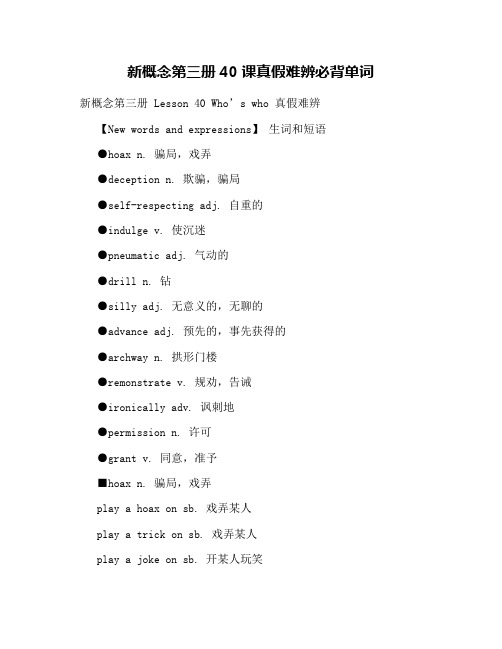
新概念第三册40课真假难辨必背单词新概念第三册Lesson 40 Who’s who 真假难辨【New words and expressions】生词和短语●hoax n. 骗局,戏弄●deception n. 欺骗,骗局●self-respecting adj. 自重的●indulge v. 使沉迷●pneumatic adj. 气动的●drill n. 钻●silly adj. 无意义的,无聊的●advance adj. 预先的,事先获得的●archway n. 拱形门楼●remonstrate v. 规劝,告诫●ironically adv. 讽刺地●permission n. 许可●grant v. 同意,准予■hoax n. 骗局,戏弄play a hoax on sb. 戏弄某人play a trick on sb. 戏弄某人play a joke on sb. 开某人玩笑Eg: The boy student is thinking how to play a hoax on his classmate.■deception n. 欺骗,骗局deception 无关紧要的骗局,并不是故意的欺骗Eg: She referred to the pills as sweet, so the harmless deception made it easy for her child totake them.deceit (故意的)欺骗Eg: We are incapable of deceit.fraud 对公众的欺骗行为,多指官方的欺骗或财政舞弊trickery 欺骗(语气上严厉),着重有步骤地诡计来谋取私利。
Eg: He had gained control of the company by trickery.■self-respecting adj. 自重的■indulge v. 使沉迷indulge oneself in sth. 沉迷于…………== be indulged inEg: He indulged himself in smoking and drinking.=He was indulged in smoking and drinking.v. 纵容Eg: She indulges her only son.■pneumatic adj. 气动的■drill n. 钻■silly adj. 无意义的,无聊的foolish 强调愚蠢的,笨的,不明智的Eg: I remonstrated him not to do anything foolish. silly 无意义的,无聊的,无知的Eg: Being called silly is not compliment.Don’t play such a silly hoax.stupid 人及言行缺乏良好的判断力,天生的迟钝Eg: His son is as stupid as all.dull 迟钝的Eg:the old man’s hearing has become dull.She is a dull girl.■advance adj. 预先的,事先获得的advance information / in advance■archway n. 拱形门楼■remonstrate v. 规劝,告诫remonstrate sb to do sth 规劝某人做某事■ironically adv. 讽刺地■permission n. 许可■grant v. 同意,准予ask sb. for permission请求许可give / grant sb. permission 准予许可。
- 1、下载文档前请自行甄别文档内容的完整性,平台不提供额外的编辑、内容补充、找答案等附加服务。
- 2、"仅部分预览"的文档,不可在线预览部分如存在完整性等问题,可反馈申请退款(可完整预览的文档不适用该条件!)。
- 3、如文档侵犯您的权益,请联系客服反馈,我们会尽快为您处理(人工客服工作时间:9:00-18:30)。
5
• • • • •
self自我的,自行的 self-acting self-aware self-check self-confidence
6
• • • •
indulge v. 使沉溺于,尽情享受 indulge in sth. 沉溺于…… Do you still indulge in the feeling of being loved?
15
16
17
18
• indulge oneself 放纵自己 • My philosophy is to try a little of everything but not over-indulge.
7
• pneumatic adj. 气动的 • pneumatic layout 气动布局
• drill n. • electric drill 钻 电钻
8
• • • •
silly adj. 愚蠢的,无聊的 Don’t be silly. 别傻了 play a silly joke on sb. 对……开无聊的玩笑
• n. 傻孩子,傻家伙 • What a silly you are!
9
• advance v. 向前推进,提前 • n. 提高,提前 • He worked so well that he was soon advanced to the position of manager.
3
• deception n. 骗局 • Politicians usually practice deception. • under deception 被骗 • 他在被她欺骗。 • He’s under her decep
self-respecting respect 尊重 show respect for 对……表示尊重 我们应该对别人的意见表示尊重。 We should show respect for other’s advice.
11
• remonstrate v. 规劝,告诫,抗议 • remonstrate sb. to do • He usually remonstrates his friends not to do anything foolish. • persuade
12
• ironically adv. 讽刺地,具有讽刺意 味地,说反话地 • “How nice the teacher is!” He said ironically.
Lesson 40
Who’s Who
2
New words
• • • • hoax n. 骗局,戏弄,恶作剧 a hoax phone call 一个戏弄人的电话 The fire station answer an emergency call but there was no fire; it was all a hoax. • trick • He took me in with his story. • take in 口语中表示欺骗
Text
• How did the police man discover that the whole thing was a joke? • What sort of practical joke do students specialize in? • What did the student tell the police? • What did the student tell the workmen?
13
• permission n. 许可 • ask permission from sb. • 在你做任何事情之前,最好向那位老人征 得同意。 • get/have permission to do sth. • 你们没有得到允许这么做。
14
• grant v. 同意(给予),答应(请求) • grant a request • take for granted • 想当然的认为,认为……是理所当然的 • Don’t take success for granted.
• advanced adj. • advanced countries • 发达国家 先进的
10
• in advance of 在……前面,超前的 • Einstein’s ideas were far in advance of the age which he lived. • in advance 事前,提前 • 关于明天的会议你能提前给我打个电话吗? • Can you give me a call about the conference hold tomorrow in advance?
